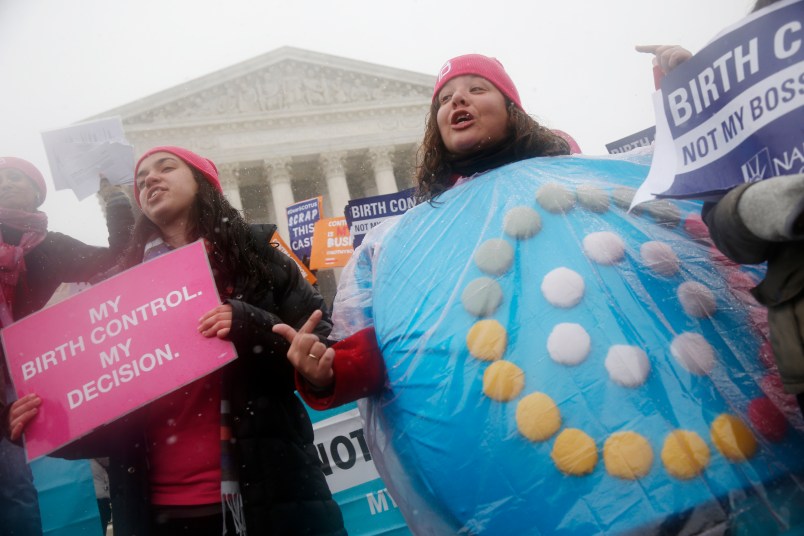Less than two hours after the Trump administration unveiled its widely expected move to gut Obamacare’s birth control mandate, the American Civil Liberties Union announced Friday that it was filing a lawsuit challenging the regulation change.
The lawsuit is being filed on the behalf of a Notre Dame Law student, Kate Rochat, as well as members of a union, Service Employee International Union-United Health Care Workers West. The ACLU in its press release said they “are at risk of losing their contraception coverage because of where they work or where they go to school. ”
The lawsuit challenges the regulations on both administrative grounds — arguing that the administration has not shown the required “good cause” for implementing the regulation without a public comment period — and also on the substance of the regulations. The lawsuit argues that the Trump administration’s move violates the Constitution’s Establishment Clause and the right to equal protection under the Fifth Amendment. Additionally, the complaint alleges that the rule is also illegal under the Affordable Care Act’s ban on sex discrimination and its prohibition of the Health Human Services Secretary from implementing regulations that create “unreasonable barriers” to accessing medical care.
Earlier Friday, the Trump administration posted what’s known as an “interim rule,” meaning that the administration is using a fast-track process and the regulation change is going into effect immediately. The administration is going forward with two interim rules, technically: one that creates a sweeping exemption to the Obamacare birth control mandate for religious objectors, and a second that extends that exemption to those who have objections based on “moral convictions.”
Under an accommodation offered by Obama’s HHS, employers with religious objections would notify the government about their objection, and the government then would seek to get the coverage for the affected women through through a third party administrator. The accommodation was subject to numerous lawsuits that were never fully resolved.
Now, thanks to the Trump administration rule change, any entity with religious or moral objections to birth control no longer has to notify the government of their objections. They can cease the coverage, and are only required to inform their employees of the change to their health plans.
Like the accommodation that proceeded it, the Trump rule stands to be the target of multiple lawsuits. Other groups and individuals have signaled they will likely sue the administration over it.
Read the complaint below:







Perhaps something to ask yourselves is why birth control pills cost more than a fraction of a cent each to buy?
Agree or disagree with trump’s move, the elephant in the room is the massively inflated prices Americans pay for access to cheap basic drugs. If the system was fixed, things like this just wouldn’t be a big issue.
I share your concern about the cost of basic drugs but your argument isn’t relevant here. The administration is not objecting to the cost of birth control - they are giving employers the right to deny basic medications because of "moral “objections.” This means that, soon, blood transfusions might not be covered (or other procedures that anyone claims to object to.) You’re trying to distract from the issue at hand.
And the same people who want to ban abortions are the same people who do not want women to have access to birth control.
My point is that basic medications that are incredibly cheap to manufacture at scale should reflect this in their price, and so be cheap enough that the poorest in society can access them without having to rely on their employer or insurer at all. If that was fixed, the argument over this weird position we’re in -unique in the developed world if not the world - where employers are in some way linked to people’s birth control would be moot.
Well, blood transfusions aren’t cheap and some religious groups object to those. Trump is opening a door (based on the GOP false sense of “morality”) which many employers will be happy to walk through. I hope no one in your family needs any of the medication or services which will be labeled “objectionable” by some employer.